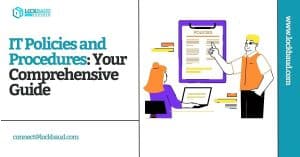Managed IT services for law firms offer a strategic advantage by providing comprehensive IT support tailored to the unique needs of legal practices. In today’s fast-paced legal environment, having a robust IT infrastructure is crucial for maintaining operational efficiency, data security, and client satisfaction. These services help law firms stay ahead by managing their technology needs, allowing them to focus on delivering exceptional legal services.
Managed IT services encompass a range of functions, from network management and cybersecurity to data backup and support. By outsourcing these critical tasks to specialized providers, law firms can leverage advanced technology and expertise that might otherwise be out of reach. This not only ensures smooth day-to-day operations but also enhances the firm’s ability to respond swiftly to technological challenges and changes.
In the following sections, we’ll delve deeper into the specific benefits of managed IT services for law firms, the role these services play in a legal office, and key considerations for integrating them into your practice.
What Role Do Managed IT Services for Law Firms Play?
Managed IT services for law firms play a pivotal role in ensuring the smooth operation and security of a law practice’s technology infrastructure. These services are designed to handle various IT tasks and challenges that law firms face, allowing them to focus on their core legal functions. Here’s a closer look at their role:
**1. Ensuring IT Reliability and Uptime:
- 24/7 Monitoring and Support: Managed IT services provide around-the-clock monitoring of your IT systems. This proactive approach helps in identifying and resolving potential issues before they impact your firm’s operations.
- System Maintenance: Regular updates and maintenance are performed to ensure all software and hardware components are functioning optimally.
**2. Enhancing Data Security:
- Cybersecurity Measures: Managed IT services implement robust cybersecurity measures to protect sensitive client data and confidential information from cyber threats.
- Compliance Management: They ensure that your IT systems comply with legal and industry regulations, such as data protection laws and client confidentiality requirements.
**3. Streamlining IT Management:
- Centralized IT Solutions: These services provide a single point of contact for all IT-related issues, simplifying management and reducing the need for in-house IT staff. Discover more about centralized IT solutions tailored for law firms
- Integration and Compatibility: Managed IT services ensure that various technology components work seamlessly together, improving overall efficiency.
**4. Optimizing Technology Use:
- Scalable Solutions: Managed IT services offer scalable solutions that can grow with your firm, adapting to changing technology needs and business growth.
- Advanced Tools and Technologies: They provide access to the latest technology and tools, helping your firm stay competitive and efficient.
**5. Disaster Recovery and Backup:
- Data Backup: Regular backups ensure that critical data is protected and can be quickly restored in the event of a disaster or data loss. Learn more about data migration to the cloud to secure and streamline your firm’s data management.
- Disaster Recovery Planning: Managed IT services develop and implement disaster recovery plans to minimize downtime and data loss during emergencies.
By outsourcing IT management to specialized providers, law firms can achieve greater operational efficiency, enhanced security, and a more strategic use of technology. This allows them to focus on their primary objective: delivering excellent legal services to their clients.

How Managed IT Services for Law Firms Benefit Your Practice
Managed IT services for law firms offer a range of benefits that significantly enhance the efficiency and effectiveness of legal practices. Here’s how these services can transform your law firm:
**1. Improved Efficiency:
- Streamlined Operations: Managed IT services handle routine IT tasks such as software updates, hardware maintenance, and system monitoring, freeing up your staff to focus on client work and legal research.
- Enhanced Productivity: With reliable and well-maintained IT systems, your team can work more efficiently without interruptions or technical issues.
**2. Cost Savings:
- Predictable Costs: Managed IT services often operate on a fixed monthly fee, which provides predictable IT costs and helps avoid unexpected expenses related to IT issues or upgrades.
- Reduced IT Overhead: By outsourcing IT management, you can save on the costs associated with hiring and training in-house IT staff, as well as investing in expensive IT infrastructure and tools.
**3. Enhanced Security:
- Robust Cybersecurity: Managed IT services implement advanced security measures, including firewalls, antivirus software, and intrusion detection systems, to protect your firm’s data from cyber threats.
- Compliance Assurance: They ensure that your IT systems comply with industry regulations and standards, helping to protect client confidentiality and avoid legal repercussions.
**4. Access to Expertise:
- Specialized Knowledge: Managed IT providers offer access to a team of IT professionals with expertise in various areas of technology, from network security to data management.
- Latest Technology: They keep your firm updated with the latest technology and best practices, ensuring you benefit from cutting-edge solutions and innovations.
**5. Scalability and Flexibility:
- Adaptable Solutions: Managed IT services can scale with your firm’s growth, allowing you to easily add new users, services, or technology as needed without significant capital investment.
- Customizable Support: Services can be tailored to meet the specific needs of your firm, ensuring that you receive the right level of support and technology for your practice.
**6. Business Continuity:
- Reliable Backup Solutions: Regular data backups and disaster recovery plans help ensure that your firm can quickly recover from data loss or system failures, minimizing downtime and maintaining client trust.
- Proactive Problem Solving: Managed IT services anticipate and address potential IT issues before they escalate, reducing the risk of disruptions to your practice.
By leveraging managed IT services, law firms can achieve greater operational efficiency, cost savings, and security, allowing them to focus on providing high-quality legal services and meeting their clients’ needs effectively.

Why Managed IT Services for Law Firms Are Essential
Managed IT services for law firms are essential for several reasons, each contributing to the overall effectiveness and stability of your practice. Here’s why these services are crucial:
**1. Complex IT Needs of Law Firms:
- Sensitive Data Management: Law firms handle a vast amount of sensitive client information, including personal, financial, and legal data. Managed IT services ensure this data is securely stored, protected, and compliant with privacy regulations.
- Specialized Software Requirements: Legal practices often use specialized software for case management, billing, and document management. Managed IT services ensure that these applications are properly integrated, maintained, and supported.
**2. Mitigating Risks and Challenges:
- Cybersecurity Threats: Law firms are prime targets for cyberattacks due to the valuable information they hold. Managed IT services provide robust cybersecurity measures to protect against breaches, ransomware, and other cyber threats.
- Regulatory Compliance: Managed IT services help law firms navigate complex regulatory requirements, ensuring compliance with industry standards and avoiding potential legal issues.
**3. Operational Efficiency:
- Minimizing Downtime: Managed IT services proactively monitor and maintain your IT systems to prevent disruptions and minimize downtime, allowing your firm to operate smoothly and efficiently.
- Optimizing Resource Use: By outsourcing IT management, law firms can focus their internal resources on legal work rather than IT issues, enhancing overall productivity and service quality.
**4. Scalability and Growth:
- Adapting to Change: As law firms grow or evolve, their technology needs change. Managed IT services offer scalable solutions that can adjust to your firm’s growth, whether it’s expanding operations, adding new users, or integrating new technology.
- Future-Proofing Technology: Managed IT providers keep up with the latest technological advancements and industry trends, ensuring your firm remains competitive and well-equipped to handle future challenges.
**5. Enhanced Client Trust and Satisfaction:
- Reliable Service Delivery: With managed IT services handling your technology, you can ensure reliable and uninterrupted service delivery, which enhances client satisfaction and trust.
- Professionalism: A well-maintained IT infrastructure reflects positively on your firm’s professionalism and commitment to protecting client information and providing high-quality service.
**6. Strategic IT Planning:
- Long-Term Vision: Managed IT services offer strategic IT planning and advice, helping your firm make informed decisions about technology investments and future IT needs.
- Cost Efficiency: By leveraging managed IT services, your firm can benefit from cost-effective solutions and avoid the financial burden of maintaining an in-house IT department.
In summary, managed IT services are essential for law firms to effectively manage their complex IT needs, mitigate risks, and ensure operational efficiency. These services support the secure and reliable delivery of legal services, allowing your firm to focus on achieving its core objectives and maintaining client satisfaction.

Questions to Ask When Hiring Managed IT Services for Law Firms
When hiring managed IT services for law firms, it’s crucial to ask the right questions to ensure you choose a provider that meets your specific needs. Here are key questions to consider:
**1. What Experience Do You Have with Law Firms?
- Relevant Experience: Inquire about the provider’s experience working with law firms and their understanding of the unique IT requirements and challenges in the legal industry.
- Case Studies or References: Ask for case studies or references from other law firms they have served to assess their track record and client satisfaction.
**2. What Services Are Included in Your Managed IT Package?
- Service Scope: Clarify what specific services are included in the managed IT package, such as network management, cybersecurity, data backup, and helpdesk support.
- Customization Options: Determine if the services can be tailored to your firm’s specific needs and how flexible the provider is in accommodating changes or additional requirements.
**3. How Do You Ensure Data Security and Compliance?
- Security Measures: Ask about the security protocols and technologies the provider uses to protect sensitive client data and ensure compliance with legal and industry regulations.
- Compliance Standards: Inquire about their experience with compliance requirements relevant to law firms, such as GDPR, HIPAA, or other data protection laws.
**4. What Is Your Approach to Disaster Recovery and Business Continuity?
- Disaster Recovery Plan: Understand their disaster recovery and backup procedures, including how often backups are performed and how quickly data can be restored in case of an incident.
- Business Continuity: Ask about their strategies for ensuring minimal disruption to your firm’s operations during emergencies or IT failures.
**5. How Do You Handle Support and Maintenance?
- Support Availability: Find out the hours of support availability, response times, and how issues are prioritized and resolved.
- Proactive vs. Reactive Support: Determine if the provider takes a proactive approach to prevent issues or primarily responds to problems as they arise.
**6. What Are the Costs and Pricing Structure?
- Pricing Model: Understand the pricing structure, including any fixed monthly fees, additional charges for extra services, and potential cost adjustments for scaling or changing services.
- Value for Money: Evaluate whether the cost aligns with the services provided and if there are any hidden fees or costs.
**7. How Do You Ensure Technology is Up-to-Date?
- Technology Upgrades: Inquire about their approach to keeping technology up-to-date, including regular updates, patches, and the adoption of new technologies.
- Future Planning: Ask about their strategy for future technology advancements and how they plan to address evolving IT needs.
**8. What Is Your Approach to Communication and Reporting?
- Communication Channels: Clarify how the provider communicates with your firm, including regular updates, meetings, and points of contact.
- Reporting: Ask about the types of reports and metrics they provide, such as performance, security incidents, and system health.
**9. How Do You Handle Onboarding and Integration?
- Onboarding Process: Understand the process for onboarding your firm, including the timeline, steps involved, and how they manage the transition to their services.
- Integration: Inquire about their approach to integrating with your existing systems and workflows to ensure a smooth and effective implementation.
By asking these questions, you can make an informed decision when hiring managed IT services for law firms, ensuring that the provider aligns with your firm’s needs and helps you achieve your technology and operational goals.

How to Integrate Managed IT Services for Law Firms
Integrating managed IT services for law firms involves several key steps to ensure a smooth transition and effective implementation. Here’s how to approach the integration process:
**1. Assess Your Current IT Environment:
- Inventory Assessment: Start by conducting a thorough inventory of your current IT infrastructure, including hardware, software, and network systems. This helps identify what needs to be retained, upgraded, or replaced.
- Identify Pain Points: Determine the areas where your current IT setup is lacking or causing issues. This could include security vulnerabilities, performance problems, or inefficiencies in technology use.
**2. Define Your IT Needs and Goals:
- Specific Requirements: Clearly outline your firm’s specific IT needs, including any specialized software or compliance requirements relevant to legal practice.
- Objectives: Set clear objectives for what you want to achieve with managed IT services, such as improved security, enhanced performance, or better support.
**3. Select the Right Managed IT Service Provider:
- Evaluate Providers: Based on your needs and goals, select a managed IT service provider with the experience, expertise, and services that align with your requirements.
- Contract Negotiation: Ensure that the service level agreement (SLA) and contract details clearly define the scope of services, performance expectations, and support terms.
**4. Plan and Prepare for Integration:
- Integration Plan: Work with your managed IT service provider to develop a detailed integration plan. This plan should include timelines, key milestones, and responsibilities for both your firm and the provider.
- Communication: Communicate with your staff about the upcoming changes and how the new IT services will impact their daily work. Ensure they are aware of any new procedures or systems.
**5. Execute the Transition:
- Data Migration: Safely migrate your data and applications to the new IT environment. This should be done with minimal disruption to your firm’s operations.
- System Configuration: Configure new systems and software according to your firm’s specific needs, ensuring they are properly integrated with existing tools and workflows.
**6. Test and Validate:
- System Testing: Thoroughly test the new IT systems to ensure they are functioning as expected and meeting your performance and security requirements.
- User Validation: Collect feedback from staff to validate that the new systems are user-friendly and effectively support their work.
**7. Provide Training and Support:
- Staff Training: Offer training sessions to help your staff understand how to use new systems and technologies effectively.
- Ongoing Support: Ensure that ongoing support and assistance are available from the managed IT service provider to address any issues or questions that arise.
**8. Monitor and Optimize:
- Performance Monitoring: Regularly monitor the performance of your IT systems and services to ensure they are delivering the expected benefits.
- Continuous Improvement: Work with your provider to identify opportunities for optimization and improvements based on performance metrics and feedback.
**9. Review and Adjust:
- Regular Reviews: Schedule regular review meetings with your managed IT service provider to assess the effectiveness of the services and make any necessary adjustments.
- Adapt to Changes: Be prepared to adjust your IT strategy as your firm’s needs evolve or as new technologies become available.
By following these steps, law firms can effectively integrate managed IT services, enhancing their IT infrastructure while minimizing disruptions and maximizing the benefits of their new technology solutions.
Sources:











